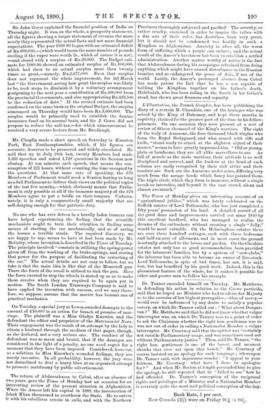Sir John Gorst explained the financial position of India on
Thursday night. It was, on the whole, a prosperity statement, all the figures showing a larger statement of revenue the more nearly they represented the actual facts and not mere financial expectations. The year 1888-89 began with an estimated deficit of Rx.698,000,—(which would mean the same number of pounds sterling if the rupee were worth 2s., which of course it is not), —and closed with a surplus of 14.38,000. The Budget esti- mate for 1889.90 showed an estimated surplus of Rx.106,000, which had risen to an actual surplus more than twenty times as great,—namely, B x.2,677,000. Even that surplus does not represent the whole improvement, for inl March last " the Government, seeing how great the surplus was likely to be, took steps to diminish it by a voluntary arrangement postponing to the next year a contribution of Rx.490,000 from the provincial Governments, and also appropriating Rx.433,500 to the reduction of debt." If the revised estimate had been confirmed on the same basis as the original Budget, the surplus announced on Thursday would have been Rx.3,600,000. The surplus would be primarily used to establish the famine insurance fund on its normal basis, and Sir J. Gorst did not propose to reduce the salt-tax,—for which announcement he received a very severe lecture from Mr. Bradlaugh.


































 Previous page
Previous page